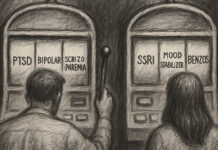DSM: Improve, Trash, Replace, or None of the Above?
Most clinicians are well aware that many diagnoses are vague, not specific, and don’t point to a treatment that works.
An Open Letter to Those I Love Whose Neurotypical Privilege Keeps Them from Seeing...
The next time you see someone who is unhoused, have some compassion.
“How Are You?” The Strangest Question to ask in a Psychiatric Hospital
Inside a psychiatric hospital, the social script doesn’t fit the situation. The location itself undermines the premise.
Peer Advocates Who Made Things Happen in Oregon
We must keep the histories of peer advocates alive, lest they be forgotten for their part in making the recovery model a vision for system change.
Counter Archiving “Mental Health Records”
Standing in front of the mirror, i wonder, “what outfit should i wear for scanning my psychiatric records at the local library?”
The Vanity Fair of Magic Potions
When someone is searching for medicine, there will always be someone else ready to sell them the “cure."
“I Can’t Remember a Single Day”: New Survey Shows Disastrous Memory Effects of ECT
114 people told us they lost vital memories like getting married, birthdays, and family events.
Green Party of California: Forced Treatment Must Be Abolished
In a public statement, the Green Party of California endorsed the Abolish Forced Psychiatry statement.
The Importance of Grief—in the Psychological Process and in Our Lives
In order to mature and to process our pain—things that are unavoidable in our lives—it is necessary to confront this grief.
Individualized Understandings of Mental Health Mislead Us
Diagnosis separates the person from their world and detaches their pain from their circumstances.
How Not to Diagnose Your Child
The reflections of a mental health professional on saving her own son from invalid and harmful labels.
Like a Refuge and Like a Prison
From Mad in Puerto Rico: Laura López-Aybar interviews Francisco about psychiatric hospitalization.
When Validation Becomes Avoidance: The Hidden Costs of Comfort in Modern Therapy
Each week, her therapist offered affirmations and reassurance. Her eating disorder remained comfortable and unchallenged.
Locura en Argentina
Editor Alan Robinson aims to provide readers with a magazine that represents them and the “mad cultures” found in Argentina.
Welcome to the Psychiatry Casino
Modern psychiatry is still, in many ways, closer to educated gambling than science. And patients deserve to know that.
A Place in the Forest: Mental Well-Being from a Wider Perspective
The whole social system as it is now is not designed with the purpose of well-being. Where has this gotten us?
Public Citizen, the FDA, and SSRI Safety
The safe and effective treatment for depression is psychotherapy and social support, not prescription drugs.
Beliefs that Create Madness
We know that it is not simply a chemical imbalance or a broken brain. We know how the context plays a large role.
Antidepressants in Pregnancy—Turning a Blind Eye, Again
You might think that telling women about the potential risks of taking antidepressants during pregnancy would be uncontroversial.
Sober Living: Why Less Clinical Sometimes Means More Recovery
Real independence is where most people stumble. Treatment can’t replicate what it’s like to live sober in the chaos of everyday life.
The Psychological Totalization of Experience: Objectification and Subjectivity
I must be a mechanistic, predictable unit, in order for a psychiatric label or a psychological variable to be implemented on me smoothly.
ECT: New Studies Detail Harms, Lack of Efficacy, Lack of Informed Consent
What people who have received ECT really think about what they were told, and about how ECT affected them.
Narrative Reclamation: Who’s Allowed to Tell Their Story?
Narratives have the power to lock us up—sometimes literally. But they also have the power to set us free.
Veteran Suicide Prevention Legislation Introduced That Will Save Lives
The bill will require prescribers to obtain written informed consent including the risks of psychiatric drugs.
It’s the Cracked Ones Who Let the Light in
The identified patient is often the healthiest: a lighthouse desperately pointing the way to the wounds and power imbalances in the family.

































